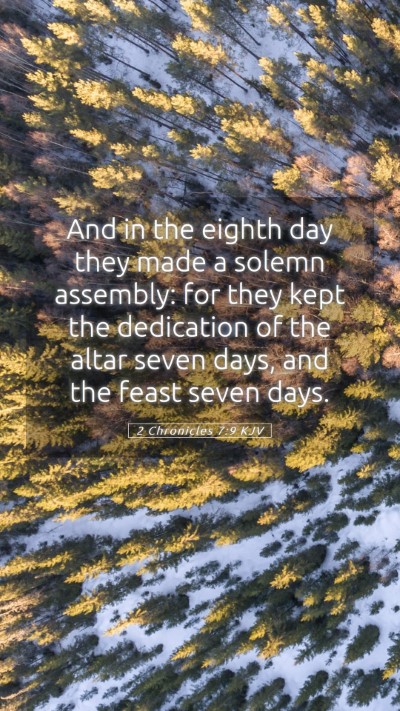Bible Verse Interpretation of 2 Chronicles 7:9
In 2 Chronicles 7:9, we find a profound moment in the biblical narrative that sheds light on the significance of worship and dedication to God. This verse occurs after Solomon's dedication of the temple, where the people of Israel come to offer sacrifices and celebrate the inauguration of this sacred place. Here, we will delve into the meaning of this pivotal verse through the lenses of public domain commentaries, offering an enriched understanding of its implications and relevance for today.
Verse Context
The verse states: "And on the eighth day they made a solemn assembly: for they kept the dedication of the altar seven days, and the feast seven days." This context is critical, reflecting not only the ceremonial observance of the temple's dedication but also the importance of prolonged worship in the life of the Israelite community.
Commentary Insights
-
Matthew Henry's Commentary:
Henry emphasizes that the eighth day, which follows the seven days of feasting and dedication, represents a new beginning. It indicates that the worship did not cease with the completion of the dedication but continued, signifying a perpetual connection with the divine. The solemn assembly reflects their commitment to God and serves as a reminder of the necessity of ongoing worship and gratitude.
-
Albert Barnes' Notes:
Barnes points out that the number eight often symbolizes new beginnings in biblical literature. He suggests that this eighth day of assembly marks the transition from the old into a new phase of divine relationship, highlighting God’s enduring covenant with His people. This notion of ongoing assembly illustrates the importance of community in worship and the Hebrews' understanding of faith as a collective experience.
-
Adam Clarke's Commentary:
Clarke adds that the solemn assembly was not just a formality but an expression of their solemnity and seriousness towards their covenant with God. He stresses how the prolonged celebration indicates their acknowledgment of God's presence and blessings. This dedication was not merely about the physical temple but spoke volumes about the inner commitment to live out their faith among themselves and with God.
Theological Implications
The verse invites readers to reflect on various themes, including:
- Continuity of Worship: The Israelites’ dedication extended beyond mere ritual; it called them into a lifestyle of worship. In modern terms, this translates to establishing regular practices that center on gratitude, prayer, and community. Understanding Scripture encourages believers to ask how they integrate worship into their daily lives.
- Covenant Relationship: The assembly emphasizes the significance of God's covenant. As believers today, one must ponder what it means to honor this relationship and recognize God's active role in their lives. Bible verse explanations promote deep dives into these covenant themes throughout Scripture.
- Significance of Community: The gathering of people reflects the necessity of communal worship and fellowship. Bible study groups today can glean from this movement toward collective dedication to God. Engaging in Scripture analysis within a community setting fosters growth and understanding of biblical teachings.
Application for Today
The lessons drawn from 2 Chronicles 7:9 resonate even in contemporary society. Believers are called to:
- Engage in regular worship and acknowledgments of God's blessings.
- Foster community within the faith, understanding that worship is best experienced collectively.
- Recognize the transformational power of new beginnings in faith journeys.
Cross References
This verse interlinks with several relevant passages that enhance our understanding:
- 1 Kings 8:66 - Solomon's prayer and dedication of the temple.
- Leviticus 23:36 - The requirement of solemn assemblies during feasts.
- Hebrews 10:25 - The call for believers to not neglect meeting together.
Conclusion
2 Chronicles 7:9 serves not only as a historical account but as a profound reminder of the continual need for worship, community, and recognition of God’s presence in our lives. Through this analysis, we can better appreciate the depth of meaning behind this verse and its application in today’s context of faith.
Further Reading
For those seeking to deepen their understanding of Bible verse meanings and commentary, consider exploring additional scripture and using Bible study resources that facilitate learning and growth in these areas.


